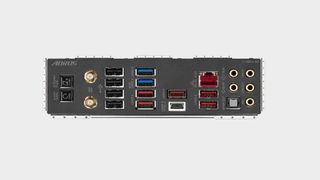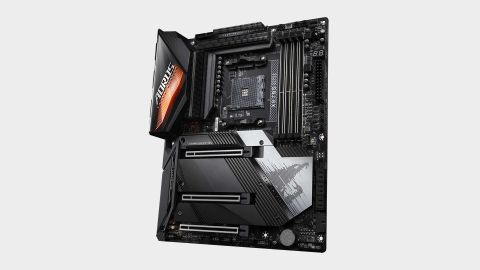Our Verdict
With its strong feature set including four M.2 slots, Wi-Fi 6E and loads of USB ports, the X570S Master justifies its price tag.
For
- Strong VRM and cooling
- Loads of USB
- Four M.2 slots
Against
- Single 2.5G LAN only
- 5G would be nice
PC Gamer's got your back
The X570 chipset might be a couple of years old, but that doesn't mean it's time to put it out to pasture just yet. With PCIe 4.0 lanes, it's possible to add year 2021 features quite easily. That’s exactly what Gigabyte has done with the X570S Aorus Master. It shares a lot in common with its already highly regarded 2019 predecessor, and with the inclusion of some key feature updates and design tweaks, the X570S Aorus Master should remain a best-in-class contender for AMD motherboards.
When we first saw X570 boards en masse at Computex in 2019, one of the things that concerned us was the almost universal presence of chipset fans. A 15w TDP combined with the heat of several PCIe 4.0 drives meant that active cooling was required in many cases, though thankfully not all the time. The S in X570S denotes silence. The base chipset design hasn't changed, but Gigabyte has added a lot of surface area to the cooling assembly, with almost the entire bottom half of the board now covered with heatsinks.
Gigabyte's high-end boards tend to look fairly similar. The X570S Master features a black theme and just a hint of RGB above the I/O section. If you want more RGB, you get five RGB headers, two of which are addressable. There are ten fan/pump headers, a Type-C USB 3.2 Gen 2 header plus power and reset buttons.
The X570S Master is one of few boards of any type to come with four M.2 slots. Notably, the topmost M.2 heatsink features a raised profile. Some M.2 drives really do run hot so a bit of additional heatsink surface area is welcome. The M.2 ports are joined by six legacy SATA ports.
Form factor: ATX
Socket: AMD AM4
CPU support: AMD Ryzen 5000 Series/ 4000 G-Series/ 3000 Series/ 3000 G-Series/ 2000 Series/ 2000 G-Series
Storage: Up to 4x M.2; 6x SATA
USB: Up to 1x USB 3.2 Gen 2x2, 6x USB 3.2 Gen 2, 6x USB 3.1 Gen 1, 8x USB 2.0
Networking: Intel AX210 Wi-Fi 6E, Intel I225-V 2.5G LAN
Audio: Realtek ALC1220-VB 7.1 Channel HD Audio
Price: $389 | £336
Gigabyte deserve credit for continuing to use finned VRM heatsinks which add a lot of surface area. They're proof that it's possible to blend function with form. A 14 phase VRM with 70a MOSFETS is enough to power a 5950X cooled by LN2 with headroom to spare, which means users of ambient cooling won't face any issue.
Gigabyte's audio implementations usually impress, and the X570S does again. Purists will swear by discrete DACs, or 3rd party solutions, but with a decent ALC1220-VB audio codec and ESS Sabre Hi-Fi 9118 DAC for headphones, along with Chemicon and WIMA audio capacitors, gamers listening to bullets and bombs rather than Bach will be happy.

The rear I/O is fully featured, particularly when it comes to USB connectivity. There are twelve ports consisting of four USB 2.0, two USB 3.1 Gen 1, five USB 3.2 Gen 2 and a single Type-C USB 3.2 Gen 2x2 port. Something has to be done about that ridiculous USB naming scheme, but that’s a story for another day. You get clear CMOS and BIOS Flashback buttons, antenna connectors, the standard audio ports with S/PDIF and finally a single Intel i225-V 2.5G LAN port.
We’d like to have a 5G option at this price. Additionally, the non-S Aorus Master had dual LAN. A second may be desirable for some but now that Wi-Fi 6 and 6E is becoming widespread, dual LAN and Gigabit in particular is not as important as it once was.
System performance
The X570 platform, with years of AGESA updates is well matured. Usually there are few surprises when it comes to performance. Anything outside of a 1 or 2 % difference raises an eyebrow. We disabled any core boosting technologies, leaving the processor in its default state.




Gaming performance




CPU: AMD Ryzen 7 5800X
GPU: MSI RTX 3080 Gaming X Trio
RAM: 16GB Teamgroup Xtreem ARGB @ DDR4-3600
Storage: 1TB Samsung 860 Pro, 500GB Samsung 980 Pro
Cooling: NZXT X73 360mm AIO
PSU: Corsair AX1000
Chassis: Thermaltake Core P8
The X570S Master proved to be quite strong under multi-threaded loads while its single threaded performance is about average. Gaming performance is bang on where we expect it to be, with margin of error differences. It also showed itself to have strong M.2 SSD performance.
We're impressed by the VRM cooling of the X570S Master, and it showed in testing. With PBO enabled on our 5800X processor, we saw a peak VRM temperature of just 48°C. That’s a full 5°C cooler than our recent test with an ASRock X570S PG Riptide.




Should you buy it? If you have an X570 board already, the answer is a resounding no.
At $389 US dollars, the X570S Aorus Master sits below the truly high-end AMD motherboards, those which add a lot of additional cost for relatively few extra benefits. Should you buy it? If you have an X570 board already, the answer is a resounding no.
But if you’ve been holding off on upgrading, for example, you are looking for something upmarket to pair with a (now readily available) high core count processor, then it’s definitely worth a look. If/when AMD releases a Zen 3+ refresh or V-Cache models in a few months, premium tier X570S boards will be first out of the gate with support.
There’s a flipside to that, though. AM4 is in the twilight of its venerable career. We’re casting an eye towards Zen 4, Alder Lake, and DDR5. There’s always something over the horizon though. But if you’re coming from something older, such as a B350 or Z170 system, and you need more cores or PCIe 4.0 support, you'll see a huge jump indeed.
The Aorus Master is packed with features that keep AM4 and X570 totally relevant and up to date. it's got loads of USB ports and storage options. It looks good too. A board around the $400 mark can't ever be considered affordable, but we feel it offers a good feature set at this price.
If you’re after what could well be the last AM4 motherboard you’ll ever need, then the X570S Aorus Master is well worth a look; there’s still some life left in the veteran AM4 socket yet.
With its strong feature set including four M.2 slots, Wi-Fi 6E and loads of USB ports, the X570S Master justifies its price tag.

Chris' gaming experiences go back to the mid-nineties when he conned his parents into buying an 'educational PC' that was conveniently overpowered to play Doom and Tie Fighter. He developed a love of extreme overclocking that destroyed his savings despite the cheaper hardware on offer via his job at a PC store. To afford more LN2 he began moonlighting as a reviewer for VR-Zone before jumping the fence to work for MSI Australia. Since then, he's gone back to journalism, enthusiastically reviewing the latest and greatest components for PC & Tech Authority, PC Powerplay and currently Australian Personal Computer magazine and PC Gamer. Chris still puts far too many hours into Borderlands 3, always striving to become a more efficient killer.
